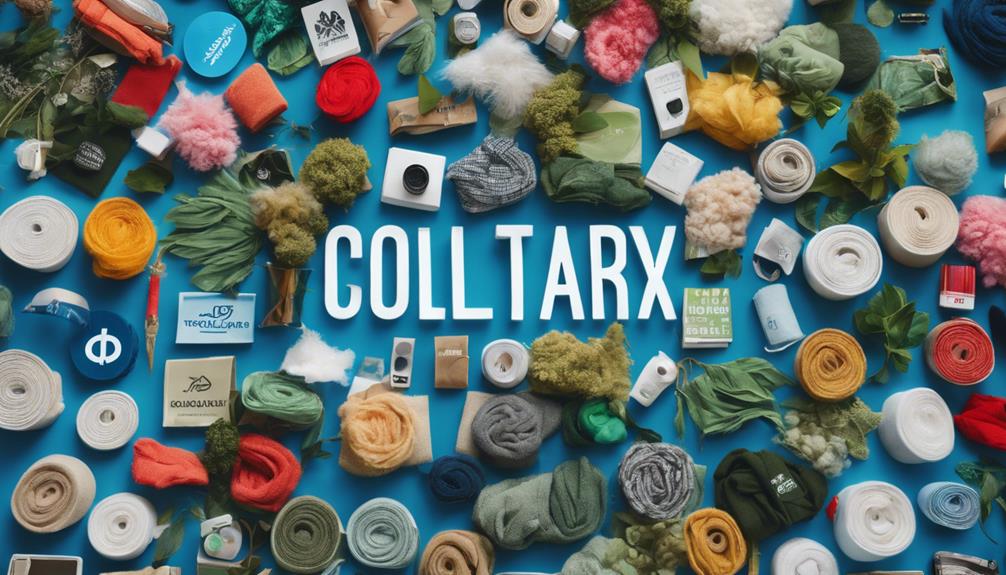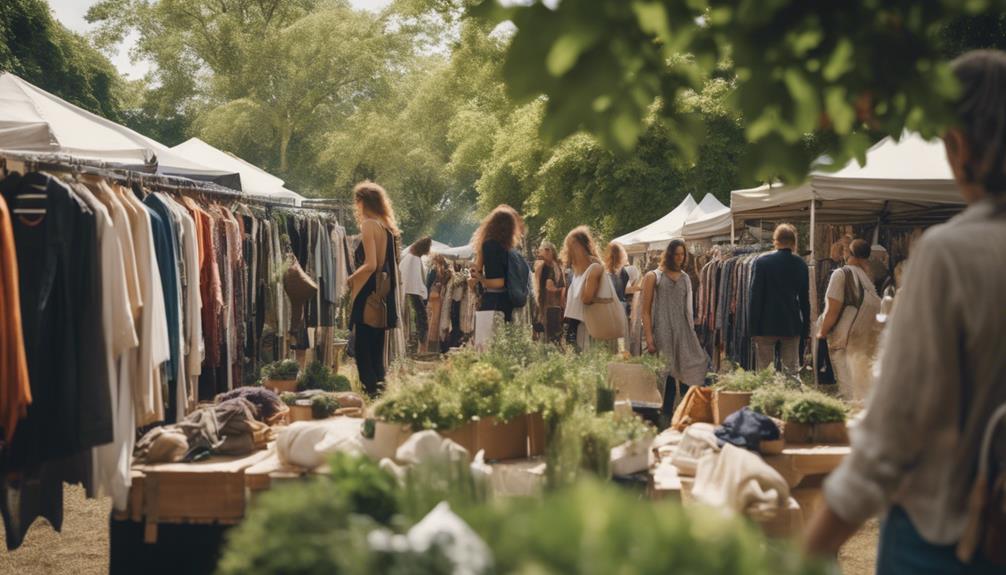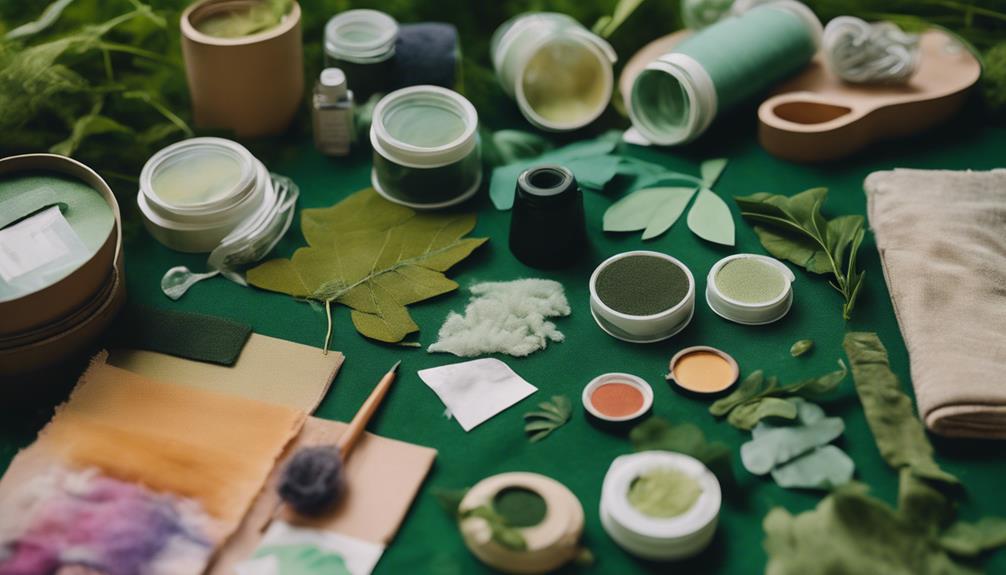You have a wealth of resources available for sustainable fashion! Explore innovative materials such as pineapple leather and linen, as well as organizations advocating for workers’ rights. Delve into educational content like “The Conscious Closet” and enlightening podcasts on ethical practices. Additionally, practical tips like clothing swaps and secondhand shopping can help you contribute to sustainability. Don’t overlook local community initiatives that promote eco-friendly choices. Prepare to be impressed by the various paths you can take towards a more sustainable wardrobe—there is so much more waiting for you to discover!
Key Takeaways
- Innovative materials like pineapple leather and linen promote sustainable fashion by reducing environmental impact and supporting ethical sourcing practices.
- Organizations such as Fashion Revolution and Remake advocate for systemic change and educate consumers about ethical fashion choices.
- Certifications like GOTS and BCI ensure that textiles meet environmental and labor standards, enhancing consumer trust in sustainable brands.
- Educational resources, including workshops and online courses, empower individuals to make informed choices and champion fair practices in the fashion industry.
Innovative Materials for Sustainable Fashion
Innovative materials like pineapple leather and squid protein coatings are transforming sustainable fashion by offering eco-friendly alternatives to traditional textiles. You'll find pineapple leather, made from waste pineapple leaves, is a fantastic choice that requires less water and avoids harmful chemicals. This makes it a prime example of sustainable materials that are both stylish and responsible.
Another exciting innovation comes from biomimicry in textiles, where natural processes inspire materials like squid protein coatings. These enhance fiber durability and even self-healing properties, meaning you won't have to replace your clothes as often.
Linen, derived from flax plant fibers, is another sustainable option. It uses minimal pesticides and less water than organic cotton, making it a hard-wearing choice for eco-conscious consumers. Plus, wool is renewable and biodegradable, actively sequestering carbon through sustainable farming practices.
Together, these innovative materials pave the way for a more sustainable fashion industry, allowing you to make informed choices. By opting for these alternatives, you contribute to a healthier planet while enjoying stylish, durable clothing.
Sustainable Fashion Organizations

When you explore sustainable fashion organizations, you'll find a range of nonprofit initiatives and campaigns dedicated to improving the industry.
These groups not only set certifications and standards but also offer valuable educational resources and workshops.
Engaging with these organizations can empower you to make informed choices and support ethical practices in fashion.
Nonprofit Initiatives and Campaigns
Nonprofit initiatives and campaigns play an essential role in advocating for sustainable practices and workers' rights within the fashion industry. Organizations like Fashion Revolution mobilize for systemic change, pushing for transparency in supply chains, especially after events like the Rana Plaza disaster. They aim to empower you to make informed choices about sustainable fashion.
The Garment Worker Center focuses specifically on garment workers in Los Angeles, promoting fair wages and safe working conditions.
Remake highlights the interconnectedness of fast fashion's impact on workers and the environment, fighting for fair pay and climate justice. They encourage consumers to think critically about their purchases.
Pay Up Fashion emerged during the COVID-19 pandemic, urging brands to honor their financial commitments to garment workers who faced severe hardships due to canceled orders.
Additionally, the Clean Clothes Campaign is a global alliance that champions workers' rights, educating consumers on ethical fashion choices and advocating for better working conditions.
Certifications and Standards
Understanding the various certifications and standards in sustainable fashion can help you make more informed choices and support brands committed to ethical practices. By recognizing these labels, you can guarantee the products you purchase align with your values. These certifications often cover factors like organic material usage, fair labor practices, and low environmental impact processes. Having a sustainable fabric certifications overview can empower consumers to distinguish between genuinely eco-friendly products and greenwashing attempts. By educating yourself on these standards, you contribute to a more transparent and responsible fashion industry.
Here's a quick overview of some key certifications in sustainable fashion:
| Certification | Focus Area |
|---|---|
| Global Organic Textile Standard | Organic textiles meeting environmental criteria |
| Better Cotton Initiative (BCI) | Sustainable cotton farming practices |
| Fashion Industry Charter for Climate Action | Reducing greenhouse gas emissions by 30% by 2030 |
| Ethical Trading Initiative (ETI) | Fair labor practices and worker rights |
| Responsible Mica Initiative (RMI) | Addressing child labor in mica mining |
These certifications set specific standards for sustainable and ethical practices, guaranteeing brands are accountable for their environmental impact and labor conditions. By looking for these labels, you can actively support companies that prioritize sustainability and ethical sourcing, contributing to a more responsible fashion industry.
Educational Resources and Workshops
Explore various educational resources and workshops offered by sustainable fashion organizations that empower you to make informed choices and advocate for ethical practices in the industry.
For instance, Fashion Revolution provides workshops that focus on ethical fashion, teaching you about transparency in the supply chain, especially in light of events like the Rana Plaza disaster.
Remake takes it a step further with online courses that equip you to champion fair pay and climate justice in fashion, emphasizing how your clothing choices can have a considerable social impact.
Additionally, the Conscious Fashion Campaign hosts webinars and events that engage both brands and consumers in crucial discussions surrounding sustainable practices, ensuring everyone understands their role in the future of fashion.
The Sustainable Fashion Forum organizes annual conferences and workshops, connecting industry leaders and advocates to share essential insights and strategies for adopting sustainable fashion practices.
Lastly, the Ellen MacArthur Foundation provides extensive educational resources, including toolkits and case studies, aimed at fostering a circular economy in the fashion industry.
Engaging with these resources can considerably enhance your understanding of sustainable fashion and its ethical implications.
Educational Resources and Literature

There are numerous educational resources and literature available that explore sustainable fashion, providing valuable insights and practical guidance for making conscious choices.
By delving into these works, you can better understand the environmental impact of your clothing decisions and adopt more ethical fashion practices.
- The Conscious Closet by Elizabeth L. Cline serves as a thorough guide to ethical fashion, helping you grasp how consumer habits affect both the environment and society.
- Overdressed, also by Cline, critically examines the fast fashion industry's detrimental effects and emphasizes the urgent need for sustainable practices.
These books, along with others, are accessible through libraries, secondhand shops, or local bookstores, aligning with sustainable practices even in how you acquire knowledge.
Engaging with this literature can greatly enhance your understanding of sustainable fashion, encouraging you to make mindful choices that contribute to a healthier planet and a more ethical industry.
Podcasts Promoting Ethical Fashion

Podcasts are a powerful way to spark eco-conscious conversations about fashion.
You'll hear expert insights and interviews that shine a light on sustainable practices and ethical brands.
Plus, you'll pick up practical tips to make more responsible choices in your wardrobe.
Inspiring Eco-Conscious Conversations
Engaging with podcasts that promote ethical fashion can spark meaningful conversations about sustainability and conscious consumer choices. By tuning into these discussions, you'll gain insights into sustainable fashion and the significance of making eco-friendly choices.
Here are a few remarkable podcasts to take into account:
- Conscious Chatter: Immerse yourself in discussions that raise awareness about eco-conscious choices and feature industry experts, shedding light on ethical brands and sustainable practices.
- Conscious Style: This podcast emphasizes how you can support ethical brands and make responsible fashion choices, highlighting the importance of transparency in the industry.
Expert Insights and Interviews
Tuning into expert insights and interviews can deepen your understanding of ethical fashion and inspire you to make more sustainable choices. Podcasts like Conscious Chatter feature discussions on sustainable brands and ethical practices, promoting awareness of the challenges and triumphs in the fashion industry. By listening to industry experts, you'll learn how to support brands that prioritize eco-friendly fashion and fair labor practices.
Conscious Style amplifies voices that highlight sustainable practices, guiding you to make informed decisions in your wardrobe. Meanwhile, Eco Chic explores innovative solutions, presenting insights from designers committed to sustainability.
If you're curious about secondhand fashion, Pre-Loved shares valuable tips and stories, encouraging you to embrace thrift shopping and clothing swaps as part of your sustainable journey.
Lastly, Remember Who Made Them raises awareness about garment workers' rights, emphasizing the importance of ethical labor practices. By tuning into these podcasts, you can stay informed, inspired, and equipped with the knowledge to make a positive impact through your fashion choices.
Practical Sustainable Tips
Listening to insightful podcasts can provide you with practical tips for embracing sustainable fashion in your everyday choices. These audio resources highlight various aspects of ethical fashion, helping you make informed decisions while reducing your environmental impact.
Here are a few podcasts to check out:
- Conscious Chatter explores sustainable fashion topics, featuring interviews with industry experts who raise awareness about ethical practices and choices in the fashion world.
- Pre-Loved emphasizes the benefits of secondhand fashion, sharing stories and tips on how to shop sustainably and extend the lifecycle of high-quality clothing through reusing and reselling.
Practical Tips for Conscious Consumers

How can you make more sustainable choices in your wardrobe while being mindful of both your budget and the environment?
Start by shopping secondhand or vintage clothing. This not only extends the lifespan of garments but also helps reduce the environmental impact of fast fashion, all while saving you money.
Look for sustainable and ethical fashion brands that prioritize eco-friendly materials and fair labor practices to guarantee your wardrobe reflects your values.
Consider renting clothing for special occasions. Rental services let you access high-end fashion without the commitment of ownership, cutting down on waste from one-time-use items.
You can also refresh your closet by participating in clothing swaps with friends or community members, allowing you to trade old clothes without spending a dime and promoting a culture of sharing.
Community Initiatives and Collaborations

Community initiatives and collaborations play an essential role in advancing sustainable fashion by connecting brands, consumers, and innovators to foster a more environmentally conscious industry. These efforts not only promote awareness about sustainable practices but also drive the shift towards a circular economy.
Here are a few notable examples:
- Zalando engages in community initiatives by promoting eco-friendly products and supporting reforestation projects, enhancing environmental sustainability.
- HURR collaborates with RePack and Oxwash, offering reusable packaging and sustainable cleaning services, while allowing users to track their environmental savings from renting clothing.
Additionally, organizations like Fashion for Good connect innovators with brands, focusing on waste reduction and regenerative practices.
Community engagement efforts, such as virtual tours of sustainable fashion museums, help raise awareness and educate the public about sustainable fashion.
Frequently Asked Questions
How Can I Contribute to Sustainable Fashion?
You can contribute to sustainable fashion by shopping secondhand, buying from ethical brands, renting outfits, repairing clothes, and donating what you no longer need. Each choice helps reduce waste and supports a more responsible fashion industry.
How Can We Improve Sustainability in Fashion?
To improve sustainability in fashion, you can choose natural fibers, support on-demand production, and embrace technologies like 3D design. Collaborating with brands focused on sustainability also strengthens your impact on reducing waste and promoting ethical practices.
How Can We Use Our Natural Resources in a Sustainable Fashion?
You can use natural resources sustainably by choosing materials like pineapple leather, linen, and ethically sourced wool. Embrace biomimicry in textiles to create innovative designs that minimize waste and conserve energy while supporting eco-friendly practices.
How Can Consumers Support Sustainable Fashion?
You can support sustainable fashion by shopping secondhand, choosing ethical brands, renting outfits for events, swapping clothes with friends, and backing local artisans. Each choice helps reduce waste and promotes responsible, eco-friendly practices in fashion. Many organizations and companies also offer sustainable fashion programs and initiatives that you can participate in or support. These programs often focus on promoting transparency and accountability in the fashion industry, educating consumers about the environmental impact of their clothing choices, and advocating for fair wages and working conditions for garment workers. By getting involved with these programs, you can make a meaningful contribution to the movement towards a more sustainable and ethical fashion industry.
Conclusion
As you explore the wealth of resources for sustainable fashion, think of it as a treasure chest waiting to be opened.
Each innovative material and organization offers you tools to make conscious choices, while educational resources and podcasts inspire your journey.
By embracing these practical tips and community initiatives, you not only enhance your wardrobe but also contribute to a brighter future.
Immerse yourself, and let your fashion choices reflect your values—it's a small step that makes a big difference!









